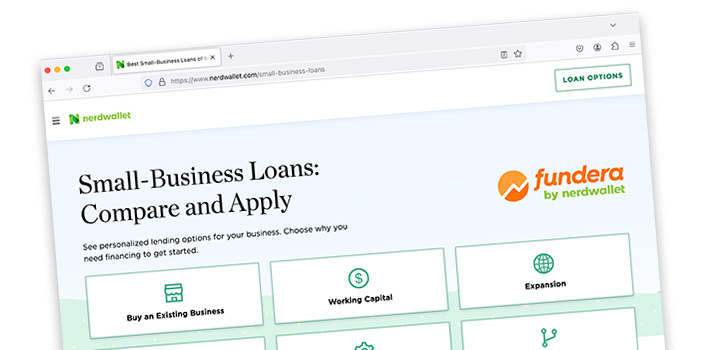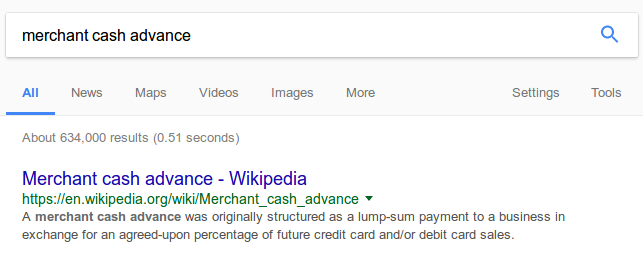seo
NerdWallet Q1: Small Business Loan Originations Down, AI Agents Are Referring Them Business
May 7, 2025Small business loan originations were down for NerdWallet in Q1 “as underwriting remained tight and trade policy uncertainty dampened demand.” This is not a new development at the company as it has been publicizing a similar sentiment for some time.
The biggest takeaways from NerdWallet’s regular reports, however, are how the company, long reliant on organic Google search listings for much of its online traffic, is weathering the transition from the online search-ranking era to the AI answer-agent era. Analysts have been asking NerdWallet CEO Tim Chen to weigh in on what they’re seeing and how it’s going. Now, in this latest quarter, Chen says that AI actually appears to be referring them business so far.
“I think as we think ahead to channels beyond Google search, for example, I’d say top of mind for us is the factors that have historically driven success in areas like Google Search seem to be carrying over to other AI driven search engines. So it’s early days here, but compared to our competitive set, NerdWallet receives a really high share of referral traffic from AI sources. So I think big picture, the way I think about it is AI, at its best, helps you find a great answer quickly without a bunch of effort or spam. And areas with simple answers, AI is gonna meet that user need really well.”
– Tim Chen, CEO, NerdWallet
deBanked independently prompted both Grok-3 and ChatGPT-4o to make recommendations to shop for a small business loan and both recommended Fundera among its top answers. Fundera was acquired by NerdWallet in 2020. ChatGPT-4o put Fundera in its top 2 and Grok-3 put them in its top 3. AI-agents are becoming more memory-based and personalized so this experiment may produce different results for others.
On search rankings specifically, NerdWallet’s Chen said that it had taken a bit of a haircut for them over the past year, in part because even search engines are also now delivering AI-based answers at the top of the results.
AI is permeating so much that the transcript of the earnings call that deBanked relied upon for this writeup was also prepared and published by AI.
Nerdwallet: Continued “Pressure in SMB Loan Originations”, Search Engine Traffic Flux
October 30, 2024 “We continue to see pressure in SMB loan originations, with rates remaining elevated and underwriting remaining tight,” said Lauren StClair, CFO of NerdWallet on the Q3 earnings call, “However, this was more than offset by growth in our renewals portfolio, which showcases the benefit of our vertical integration strategy and the reoccurring nature of the vertical when we pursue a higher touch experience.”
“We continue to see pressure in SMB loan originations, with rates remaining elevated and underwriting remaining tight,” said Lauren StClair, CFO of NerdWallet on the Q3 earnings call, “However, this was more than offset by growth in our renewals portfolio, which showcases the benefit of our vertical integration strategy and the reoccurring nature of the vertical when we pursue a higher touch experience.”
NerdWallet CEO Tim Chen further said that it was a “tough macro environment in SMB loans.”
Their SMB business overall, which includes several products, not just loan referrals, did well however in Q3, generating double digit YoY growth for a total of $27.8M in revenue.
Of additional note is NerdWallet’s commentary on search engine traffic and its impact to its business.
“After a stronger start of the quarter, we saw some additional deterioration in our search visibility in mid-Q3,” said Chen. “While traffic to our monetizing shopping-oriented content started to rebound as we exited the quarter, traffic to our non-monetizing learning-oriented content did not. As a result, Monthly Unique Users were down 7% year-over-year in Q3.”
deBanked drew attention to their search engine observations this past August after hearing Chen muse that the current state of organic search result rankings were not actually helping business owners get business loans. Chen dived into this subject yet again on the Q3 call, the full quote of which is worth including:
“So, during our Q2 call, our search visibility was broadly stabilizing and actually starting to rebound a little bit. And then soon after our Q2 call, things took a turn for the worse. So with our shopping traffic, things got worse in August and September. But then going into October, rebounded back to a level that was a bit better even than where we were when we did the Q2 call. We think we did some things on our end to clean up the user experience that were net positive. Now, there were some exceptions, so for example, parts of credit cards and personal loans are still lagging. But, overall, we got a pretty good place – we got to a pretty good place on shopping pages and feel like we’ve figured out what to improve.
Conversely, for that far bigger bucket of education-oriented traffic that is less commercial in nature, things got progressively worse throughout the quarter and recently stabilized at a lower level. So, what’s happening there is a renewed push by search engines to incorporate their own answers directly into the search results, like you mentioned AI overviews as an example. So, for those of you who have been following search over the years, this isn’t really anything new. So, for example, at one point when you search for the weather, it didn’t show up directly in the results, and eventually a module was inserted there. That trend towards the simpler stuff being pulled into search results is inevitable, and we’ve always been more insulated from that, but historically it happens in waves, and sometimes haircuts are MUUs.
So, we’ve generally seen a re-baselining after any major changes, and then eventual growth from there as you lap the impact. Oftentimes, those changes are rolled back. And so, over the last 10 years, I’d say these changes come in waves, and we’re in the middle of a big wave, and as long as we focus on delivering consumer value, we’re steering in the right direction, and things tend to sort themselves out. So, this headwind is driving our outlook for further MUU deceleration in Q4, because of the full quarter impact of some of the stuff that happened with those headwinds.
Now, in the long run, I do think an improving search experience is a win for the overall ecosystem and keeps it healthy and growing. And, really, I’d say the silver lining here is that Q3 was pretty brutal as far as some of the headwinds we faced in organic search, especially in highly commercial areas, and being able to hit like a 12% NGOI margin in Q3 in spite of that headwind is really a testament to some of the progress we’ve made in building a brand and a direct relationship with our users and our increasing competitiveness in other channels.”
Lawsuit Alleging Google Ad Abuse is Latest Iteration of the Search War
May 20, 2021 Google parent company Alphabet reported a record profit in Q1 2021 of $18 billion, up 162% from 2020. The firm attributes the success to a 32% surge in Covid related advertising sales.
Google parent company Alphabet reported a record profit in Q1 2021 of $18 billion, up 162% from 2020. The firm attributes the success to a 32% surge in Covid related advertising sales.
A recent lawsuit from ten US States filed in a district court in Texas would argue that it’s not just a covid based bump in ad sales. According to the WSJ, in response to the lawsuit, Google accidentally confirmed what prosecutors suspected: they run a secret program called “Project Bernanke” that uses proprietary data to win bids on the firm’s ad exchange, netting hundreds of millions of dollars over the years. It amounts to a digital ad monopoly, which has already pushed Google’s parent company, Alphabet, to new highs.
Google’s ad exchange works like a stock exchange for marketing, as enterprises buy and sell placements and seconds of attention within the Google advertising universe. Firms bid on purchasing slots for ads in browsers and videos, and the auctions happen lightning fast in real-time. The lawsuit from ten states through the Taxes district court alleges Google used insider information on what they knew firms were willing to pay, to drive the prices as high as they would go.
Google is both on the buy and sell-side of its transactions and admitted in the papers WSJ saw that the data they mined to inform bids in Project Bernanke was not disclosed to publishers. The papers were quickly redacted and sealed by a judge days after WSJ found the details. The documents also mention “Jedi Blue,” a sweetheart deal between Google and Facebook. Instead of competing with Google ads, Facebook agreed to bid on and automatically win a fixed percentage of Google ad auctions. The deal originated back in 2018 when Facebook announced it was joining a competitor advertising program called “open bidding.” The states’ lawsuit alleges the firms must have made a side deal then, and the leaders of the internet ad market colluded; it’s why a bipartisan coalition of ten states is pushing back.
deBanked has tracked Google’s relationship with funders who use the search engine for marketing their products. After reducing the effetiveness of SEO and forcing most businesses into buying ad space out of necessity, the new lawsuit alleges Google rigged the game for themselves. The House always wins.
Back in 2012, deBanked’s Sean Murray first evaluated the SEO landscape. Google punished blogs that were printing out backlinks by the hundreds, nose-diving the competitive market for SEO rankings.
In 2014, Google’s “penguin algorithm” inflicted further pain.
In 2017, Google outright blocked merchant cash advance as an advertising keyword.
“You Can’t Stay Static”: Paul Teitelman and the Building of an SEO Firm
June 30, 2019
 How does someone become an SEO expert? How does someone found a successful SEO consultancy firm? For Paul Teitelman, his road to SEO mastery and independence started by admitting he knew nothing about the industry.
How does someone become an SEO expert? How does someone found a successful SEO consultancy firm? For Paul Teitelman, his road to SEO mastery and independence started by admitting he knew nothing about the industry.
Beginning in the late noughties, following his graduation in Marketing Management from Dalhousie University, Teitelman went to an Interactive Advertising Bureau job fair, pitched himself to his soon-to-be boss, and replied, “No! But I’m your man. I’ll learn it all,” when asked if he knew anything about SEO.
Thus began his tenure at Search Engine People, one of Canada’s first Search Engine Marketing companies. Here he entered as a Link Ninja and learned the trade by implementing SEO campaigns for both Fortune 100 and 500 companies as well as for local businesses. From this, he advanced to a managerial position, in which he led teams of SEO specialists who were responsible for ensuring clients would appear at the top of Google search pages. And then, in 2011, Teitelman left Search Engine People to make his own way, becoming the CEO and founder of his self-titled, Toronto-based SEO consultancy firm.
How did the move to independence pan out? Well, as of June 2019 he has hired his 25th employee, his team is kept busy servicing the needs of clients, and he experiments with pioneering SEO strategies and theories within his own blog network. Claiming that his firm offers “the best of both worlds” as a result of him having worked on both ends of the SEO spectrum, Teitelman explains that clients benefit from his offering of the transparency, promptness, and directness that are inherent with small firms; and that he reaps the reward of an agency price tag, a perk that comes with producing consistently successful SEO work.
 When asked about how others could follow in his footsteps, he said, regardless of the industry, whether you’re an SEO expert or broker, that “you can’t stay static.” Emphasizing the necessity of having foresight when you leave your old job, Teitelman notes that entrepreneurs need to stay ahead of the curve of trends, be that an update to Google’s search result algorithm or a niche opening in the alternative finance market. As well as this, Teitelman highlighted the importance of being secure in that knowledge that when you leave to make it independently you will have a list of clients to take with you, who’ll keep you from leaving yourself high and dry.
When asked about how others could follow in his footsteps, he said, regardless of the industry, whether you’re an SEO expert or broker, that “you can’t stay static.” Emphasizing the necessity of having foresight when you leave your old job, Teitelman notes that entrepreneurs need to stay ahead of the curve of trends, be that an update to Google’s search result algorithm or a niche opening in the alternative finance market. As well as this, Teitelman highlighted the importance of being secure in that knowledge that when you leave to make it independently you will have a list of clients to take with you, who’ll keep you from leaving yourself high and dry.
And much like how the merchant cash advance scene in Canada has seen an increase in both interest and product knowledge amongst customers over recent years, as has SEO. Subject to myth-making and conjecture as a result of its technical lingo and specialized nature, SEO has long been the victim of misunderstanding according to Teitelman, who says those who are curious about the service “shouldn’t believe everything they read on the internet.”
Going on to say that “the more education customers get, the more exciting the industry becomes,” it’s clear that Teitelman is looking forward to the future of SEO. Time will tell if his offer back in 2008 will be matched by interested industries, curious about the possibilities that SEO promises and willing to “learn it all.”
Paul Teitelman is also speaking on a sales and marketing strategies panel at deBanked CONNECT Toronto on July 25th alongside Smarter Loans President Vlad Sherbatov and SharpShooter Funding Managing Partner Paul Pitcher.
Google Will Ban Cryptocurrency Ads
March 14, 2018Today, Google updated its list of banned advertising content to include “cryptocurrencies and related content (including but not limited to initial coin offerings, cryptocurrency exchanges, cryptocurrency wallets, and cryptocurrency trading advice).”
This comes as Facebook made the same decision at the end of January. While Facebook’s prohibition of cryptocurrency-related ads came into effect immediately, the Google ban will not begin until this June.
The value of Bitcoin dropped by 9.1 percent in the wake of this news. Critics contend that this overarching ban may hurt the legitimate use of cryptocurrencies, while crypto detractors are pleased that cryptocurrency fraud will soon be significantly restricted.
In June, Google will also prohibit ads related to Binary options, a type of financial contract that promises either a fixed amount of compensation or nothing at all.
Google Restricts Ads for Merchant Cash Advances
October 8, 2017Google’s quest to stamp out payday loan advertisements from its paid search results has caused collateral damage to merchant cash advances. That’s because the two-word term cash advance, often synonymous with payday loan, appears to now have a blanket restriction that blocks ads whenever that term is included in search, regardless of the words that come before it or after it.

Merchant cash advances, however, are commercial factoring transactions with no relation to payday or consumer finance.
A user on the deBanked forum first alerted me on October 5th and deBanked conducted tests from internet connections in two states to see if we could replicate the results. Below is a sample of our results:
| Keyword | Google Adwords Status |
| cash advance | BLOCKED |
| merchant cash advance | BLOCKED |
| business cash advance | BLOCKED |
| business loan | ACCEPTED |
| loans | ACCEPTED |
| get a business loan | ACCEPTED |
| loan for my business | ACCEPTED |
| cash advance for my business | BLOCKED |
| business loan companies | ACCEPTED |
| merchant cash advance companies | BLOCKED |
| factoring or business loans or credit cards | ACCEPTED |
| factoring or business loans or merchant cash advances | BLOCKED |
| loan from ondeck | ACCEPTED |
| cash advance from ondeck | BLOCKED |
| consolidate loans | ACCEPTED |
| consolidate cash advances | BLOCKED |
No such block exists on rival search engine Bing.
Though Google has not said this, the mass removal of payday lending ads, once a massive source of revenue for them, is likely the result of government pressure. Over the last two years, federal regulators have begun targeting lead generation sites that direct users to lenders in a misleading manner.
Unless Google fixes the glitch that caused merchant cash advances to get wrapped up with consumer cash advances, the organic search results will experience a huge boost in value. Last month we reported that companies like OnDeck, Fundera, and Nerdwallet were winning the search engine optimization battle for several keywords including merchant cash advance. Absent any ads, those companies and several others will now benefit from a stream of free traffic and applicants for which their cost of acquisition will be zero dollars.
Perhaps little has been mentioned about this ban within the industry because the end result is FREE leads for those that rank well organically. Long live SEO!
The Google Battle for Lending and SMB Finance Keywords
September 14, 2017The online lending battle is at least in part being fought online. Below is a chart of organic page 1 rankings in Google for some of the industry’s biggest players, banks, and the SBA. (Hat tip to Fundera and NerdWallet):
| Keywords | OnDeck | Kabbage | Fundera | Lending Club | NerdWallet | National Funding | Traditional Banks | SBA.gov |
| business loan | 1 | 9 | 3 | 5 | 4,7 | 6 | ||
| merchant cash advance | 2 | 3 | 4 | 8 | ||||
| working capital | 9 | 4 | ||||||
| commercial loan | 3 | 2,7 | ||||||
| small business loans | 2 | 3 | 5 | 7 | 1 | |||
| business line of credit | 3 | 2 | 11 | 1,4 | 6,7,8,9,10 | 5 | ||
| fast business loan | 1 | 4 | 2 | 5,6 | ||||
| business loan with bad credit | 7 | 1 | 2 | 3 |
The Top 10 Google Search Results for Merchant Cash Advance in February 2012 compared to now:
| February 2012 | September 2017 |
| MerchantCashinAdvance.com | Wikipedia |
| Yellowstone Capital | OnDeck |
| Entrust Cash Advance | Fundera |
| Merchants Capital Access | NerdWallet |
| Merchant Resources International | Businessloans.com |
| American Finance Solutions | Bond Street |
| Nations Advance | Capify |
| Bankcard Funding | National Funding |
| Rapid Capital Funding | CNN |
| Paramount Merchant Funding | CAN Capital |
The top result in 2012 is a great example of how much easier it was to game Google’s system back then. After achieving rank #1 for MCA and 300 other related keywords, MerchantCashInAdvance.com, which was just a lead generation site, sold for $75,000 in December 2011. The site was later clobbered by Google Penguin for black hat SEO and banished from visibility.
A major shift has obviously taken place over the last 5 and a half years. Is the search results game rigged to advance Google’s own interests? Three years ago I put forth my theory on that.
One thing that’s different between then and now is that Google now has 4 paid links above the organic search results as opposed to 3 and the paid links blend in more with the organic results. With the organic results pushed further down the page, they’re not as visible as they were five years ago.
Read my previous analyses on the industry’s search war over the years:
December 2015 Google Serves Low Blow to Merchant Cash Advance Seekers
March 2015 Google Culls Online Lenders – Pay or Else?
October 2014 Merchant Cash Advance SEO War Still Raging
August 2014 Six Signs Alternative Lending is Rigged: Do Lending Club and OnDeck have a helping hand?
October 2013 Google Penguin 2.1 takes swing at the MCA industry
August 2013 Your merchant cash advance press release may be hurting you
December 2012 Is Google your only web strategy?
July 2012 The other 93% [of leads]
April 2012 The SEO war continues
February 2012 The SEO War for Merchant Cash Advance: The first story on this topic
Revenue Advance Searches Up, Small Business Loan Searches Down
September 8, 2015Back in early 2013, I explored the popularity of Google search phrases related to the industry. At the time, keyword phrases such as merchant cash advance were on a downswing after reaching their peak back in September 2008. Oddly, the keyword hasn’t been able to match the popularity it had seven years ago, but it is on the way back up.
Other keywords are just about dead, but perhaps most interesting of all is that small business loans has been declining consistently for about ten years straight, though it appears to have tapered off a bit.
Take a look:
three additional terms: merchant loans, ach loan, merchant financing
Hanna Kassis of Oarex Capital Markets noticed that the term Revenue Advance is at an all-time high. You can read his thoughts about that here:





























